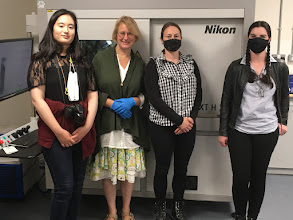The work of two of our PhD students concerning the mystery surrounding the remains of two Early Medieval persons buried at Lowbury Hill, Oxfordshire, has come to public prominence this month as we prepare for a full osteological analysis of their remains. The Lowbury duo were discovered by Donald Atkinson, a research fellow from Reading’s Classics Department, in his 1913-14 excavations at the site, which inspired the Ure Museum’s curator Annie Ure, then a student. The pair—a woman and a man—were then displayed together in a two-part glass case in University College Reading’s Museum of History and Archaeology, a precursor to the Ure Museum. Since the 1920s their remains fell into obscurity. Subsequent analysis of the male, discovered within an Early Medieval barrow, suggests he was a seventh-century warrior who lived in Cornwall or western Ireland before being buried on Lowbury Hill. Since 2017 his remains, along with his elaborate grave goods—including a sword, shield, enamelled spearhead, knife, shears, a bronze hanging bowl and a bone comb—have been on display at the Oxford shire Museum in Woodstock. Remains of the woman, who had been buried in line with the wall of a Roman-era enclosure on the hilltop, are normally stored in Standlake. A partial analysis suggests she reached the age of ca. 40 and was buried between 550 to 650 AD. Because she was buried without grave items, little else is known about her.
shire Museum in Woodstock. Remains of the woman, who had been buried in line with the wall of a Roman-era enclosure on the hilltop, are normally stored in Standlake. A partial analysis suggests she reached the age of ca. 40 and was buried between 550 to 650 AD. Because she was buried without grave items, little else is known about her.
The Oxfordshire County Council has announced the removal of the male from their museum, in preparation for Summer Courts’ osteological analysis of both individuals, to be undertaken at the Cranfield Forensics Institute, under the supervision of Dr Sophie Beckett, one of her PhD supervisors. Her research is co-supervised by Reading’s Professor Amy Smith and Angie Bolton (Oxfordshire Museum Service) and funded by the Arts and Humanities Research Council via the South, West and Wales Doctoral Training Partnership Collaborative Doctoral Award. Then the team will send samples to Germany for analysis in collaboration with Professor Stephan Schiffels at the Max Planck Institute for Evolutionary Anthropology. Look for another press release in the coming days as Summer begins her analysis.
At the same time the local community has now become interested in the project through a display at the Goring Public Library, accompanied by a series of public events. Seongmee Yoon, another one of our PhD students, co-supervised by Prof. Smith and Dr Rhi Smith (Museum Studies, UoR), has taken this opportunity to study public perceptions of the site, the mysterious duo, and Anglo-Saxons, as part of her museological research. The entire team enjoyed the hospitality of Goring’s Catholic Church this Wednesday night when a sold-out audience heard presentations by Summer and Angie, followed by a poetry reading by Amy. As Summer said, “The study has given us the chance to explore a fascinating site with a thrilling history while applying several archaeological approaches and working with an invested and excited local community.”
More information on the research can be found at the project website: research.reading.ac.uk/mymerian



 What do you get if you cross cutting edge research in the ancient world with creative talent?
What do you get if you cross cutting edge research in the ancient world with creative talent? The Research Centre for Greek and Latin Literature of the Academy of Athens is delighted to invite you to the 6th online lecture of its 2020-2021 Seminar ([Self-]Praise & [Self]-Blame in Ancient Literature).
The Research Centre for Greek and Latin Literature of the Academy of Athens is delighted to invite you to the 6th online lecture of its 2020-2021 Seminar ([Self-]Praise & [Self]-Blame in Ancient Literature).
 We would like to bring to your attention a fully-funded PhD studentship:
We would like to bring to your attention a fully-funded PhD studentship: